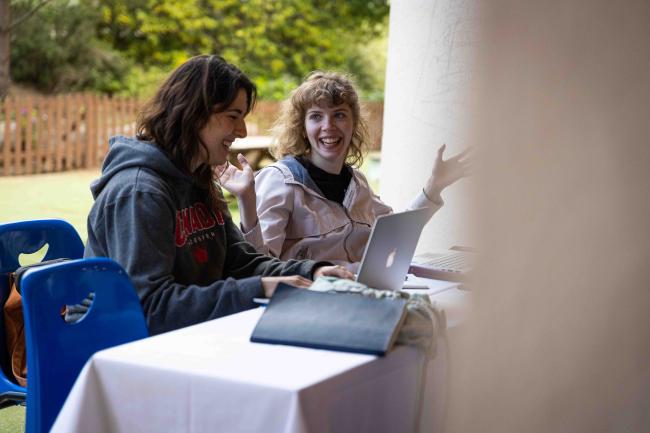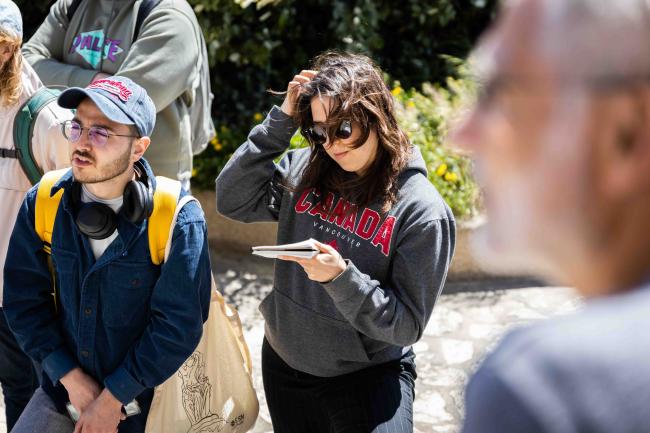Tackling Global Water Challenges: Silvia Graells explains her experience in the Water Track

The master's programme in Global Challenges for Sustainability consists of three phases. Students from the current cohort will soon complete the second phase in which they have chosen a track on food, water or life & health. We asked students from each of the tracks about their experiences. In this episode, Silvia Graells, who is studying the water track in Montpellier, shares her experiences with the water track.
Why did you choose the water track?
The climate crisis is now severer than ever, especially in the Mediterranean area, the area where I grew up where there’s indeed water scarcity, and occasional short high-intensity rains happen as well. The fact that both extremes can take place at the same time is very intriguing to me, so I thought it would be interesting to dig into these problems both on a personal as well as professional level. Besides, the water track is the most nature-related of the three, and I have always been interested in water systems, specifically wastewater management.
What was the most challenging for you while learning in the water track?
In the water track, we have learned about The Netherlands’ situation regarding the rising sea water level and their strategies to overcome it. Naturally, most of the experts are Dutch, while most of the lectures for those modules were held online. The hybrid setting is truly convenient, but having more in-person lectures would make the learning process more enjoyable, making it easier to stay focused and keep the motivation going!
What did you learn that was the most unexpected?
Access to water in deserted areas, water purification for safe-drinking purposes, transboundary conflicts, decolonial practices and approaches, indigenous’ rights to water, or the legalization of water bodies are some of the concepts and theories that I learned for the first time and found very interesting. Moreover, many case studies from around the world were presented to us, which gave me a solid overview of what the situation worldwide is concerning water.
What is your studies background and how did it help you during phase 2?
The water track covers the more natural science perspective of what sustainability entails. Having an Environmental Science background provided me with a solid knowledge of the natural sciences realm (biology, geology, physics, chemistry, etc.), as well as more specialized subjects such as ecology or physical climatology. For these reasons, the modules in the water track were easy to follow but also gave me a lot of extra useful information that I did not know yet.
What would you tell another student who might be interested in studying that track?
Regardless of your academic background, all lectures are easy to follow and provide you with a basic knowledge of what the water cycle and its uses are about. It’s true that if you have a scientific background some concepts are going to sound more familiar, therefore some lectures might be easier to follow. Nonetheless, the pace at which it’s taught allows everyone to follow simultaneously making sure no one is left behind.
Why did you join CHARM-EU?
I had been looking for a sustainability master’s programme for a long time before joining CHARM-EU but none seemed to be the right match for me. I did hope that my interest in language learning and culture exchange would be fulfilled here. Students come generally from Europe, but also from all around the world, which is very enriching and makes for a very fun mix of cultures and languages. Moreover, the fact that mobility is compulsory also meant I had a good excuse to travel around, which definitely sold it for me!
Where are you going to study next semester for phase 3?
For Phase 3 I am staying in Montpellier, and I’m very excited about it! The UNESCO’s International Center for Research on Water Systems Dynamics (ICIREWARD) is located here, which means there’s plenty of workshops and conferences that we as students can attend aside from the mandatory lectures. If you want to find like-minded professionals to network with or know more about the current research lines, Montpellier is the place to be.
Do you already know about your Capstone project?
On my Capstone project, along with a local NGO and three other ‘Charmies’, I am going to work on studying the citizen’s perception of biodiversity. Particularly, we are going to focus on marine conservation in the Mediterranean. What I like about this project is that it has a very strong social approach, with both social and ecological perspectives being equally relevant.
Interested in hearing about the other two tracks, Food and Life and Health? More interviews will come soon! Stay tuned to CHARM-EU news by subscribing to our newsletter!



